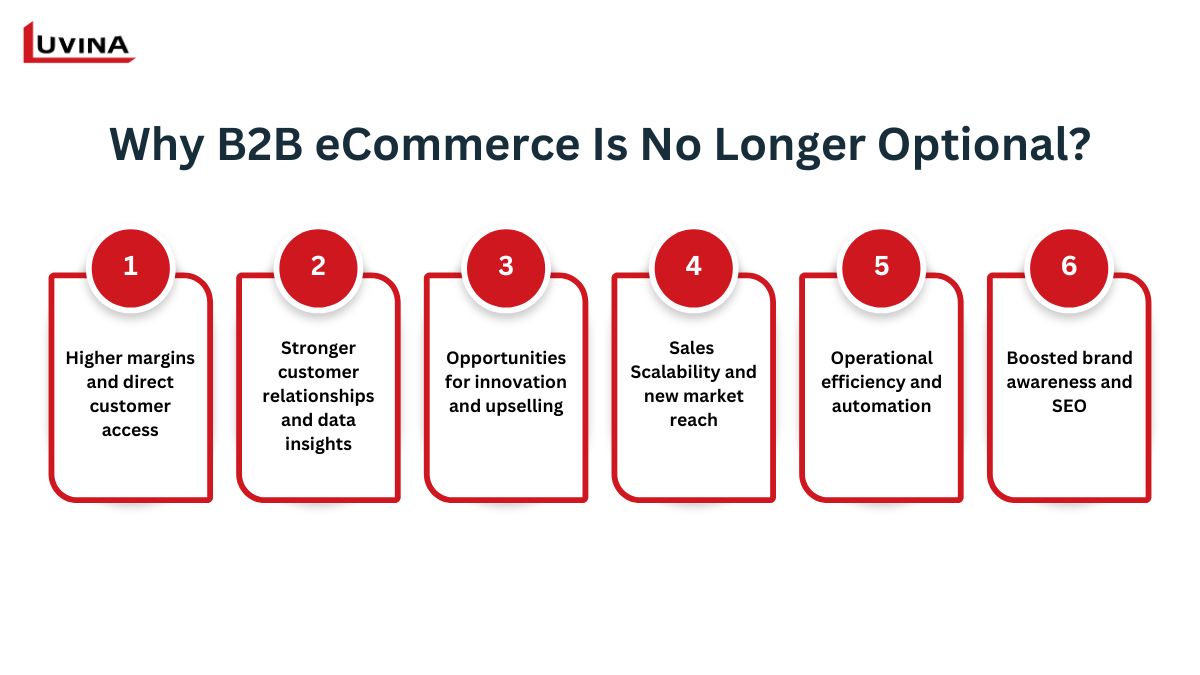Picture this: your best client can place a large order at 2 AM without ever having to pick up the phone or wait for a sales representative to respond. That’s not science fiction anymore; it’s the new baseline. For manufacturers and wholesalers, this shift isn’t just about adding a shopping cart. It’s about building a future-proof sales engine that satisfies the digital-first generation of buyers who expect speed, self-service, and a frictionless experience. That’s where B2B ecommerce website development for manufacturers comes in. Done right, it can transform the way you sell, serve, and scale.
In this article, you’ll discover what sets a winning B2B platform apart, how it differs from B2C ecommerce, and which core features you simply can’t ignore. Ready to see how your online store can become your biggest growth channel yet? Let’s dive in.
Why B2B eCommerce Is No Longer Optional
Investing in B2B ecommerce website development for manufacturers is now a strategic move to seize a market worth trillions, not a luxury. According to recent estimates, 80% of B2B sales will be generated digitally by the end of 2025, compared to just 13% in 2019. The share of B2B organizations’ revenue from digital channels is projected to reach 56% in 2025, up from 32% in 2020, showing how rapidly the landscape is shifting.
From efficiency improvements to worldwide reach, here is why forward-looking companies are embracing digital transformation with a custom B2B ecommerce platform for wholesalers.

- Higher margins and direct customer access: Creating a strong digital channel lets you sell directly to your consumers without depending only on resellers. This preserves your profit margins and gives you better control over brand presentation – an advantage that B2B ecommerce website development for manufacturers delivers at scale.
- Stronger customer relationships and data insights: A custom B2B ecommerce platform for wholesalers allows you to collect valuable data on buyer behavior, preferences, and purchasing cycles. This means you can personalize offers, run targeted campaigns, and build loyalty programs that keep customers coming back.
- Opportunities for innovation and upselling: Modern platforms use procurement data to predict customer needs, unlocking smarter upselling and inventory planning.
- Scalability and new market reach: For producers, a well-designed B2B ecommerce website development for manufacturers can provide chances to approach new markets and audiences without the expense of growing physical sales teams. As your company expands, you may easily handle higher order counts and grow your catalog. You may also adapt quickly.
- Operational efficiency and automation: Manually processing orders, invoicing and checking inventory when orders are processed on paper and through emails takes time, effort, and money. Getting all of these functions automated through your ecommerce business website allows employees to spend their time on higher-value work, while your customers receive faster processing and do not experience errors.
- Boosted brand awareness and SEO: A professional e-commerce website acts as a 24/7 storefront that helps new buyers find you through search engines. With built-in SEO tools, you can attract both product-specific and branded searches, growing recognition and authority in your niche.
Key Differences Between B2B and B2C eCommerce Websites
At first glance, selling online may seem similar for any business, but the gap between B2B and B2C is huge once you look under the hood. Understanding these differences is vital if you want your B2B ecommerce website development for manufacturers to truly serve business buyers’ complex needs instead of mimicking a B2C store. This quick comparison will show you exactly where the priorities shift and why your strategy must be built around them.
| B2C eCommerce website | B2B eCommerce website | |
| Target audience | Individual consumers | Business clients, buyers, and other companies |
| Pricing model | Fixed pricing, discounts, and promos | Complex pricing structures with tiered or custom quotes |
| Ordering & quoting | Single-item or small-basket orders | Bulk ordering, custom quoting, and negotiated pricing |
| Purchase approvals | Instant purchase by end-user | Multi-step purchase approvals, account-based pricing |
| Integration needs | Basic: payment gateways, shipping | Deep integrations: ERP, CRM, warehouse management, supply chain |
| Contracts & repeat orders | Short-term, transactional | Long-term contracts, recurring orders, and repeat bulk procurement |
| Buyer journey | Shorter, emotional, impulsive | Longer, logic-driven, multiple touchpoints, and account management |
| Payment options | Credit/debit cards, digital wallets | Invoicing, net terms, ACH transfers, credit lines, and purchase orders |
| Website design | Visual appeal, simple checkout | Feature-rich portals, self-service, tailored workflows, and custom catalogs |
Core Features of a Custom B2B eCommerce Platform
When it comes to B2B ecommerce website development for manufacturers, success depends on building a platform that doesn’t just look good but solves real operational challenges. That’s why choosing the right technology stack and adding the right features is crucial.
For example, many manufacturers and wholesalers rely on platforms like Magento, BigCommerce, or Shopify Plus, often combined with custom integrations using React, Node.js, or robust API frameworks to seamlessly connect their ERP and CRM systems. Below are the must-have features you should prioritize when planning your platform.
| Features | Description |
| Custom catalog management | Create role-based or customer-specific catalogs to ensure buyers see only the products and pricing relevant to them, supporting a complex sales structure |
| Quote management & negotiation | Allow customers to request quotes, negotiate pricing, and approve final deals online, streamlining the sales cycle for larger or custom orders. |
| Advanced product filtering & specs | Offer robust search and filtering by SKU, technical specifications, category, and price. This makes it faster for buyers to find exactly what they need, especially in large or complex catalogs. |
| Bulk ordering & reordering | Enable easy bulk orders, reordering of frequently purchased items, and enforce minimum order quantities (MOQs) to align with manufacturing requirements. |
| Multi-tier pricing & deals | Support tiered pricing structures and account-specific discounts, so you can cater to different buyer segments and loyalty levels without manual intervention. |
| Integration with ERP/CRM systems | Seamlessly connect your e-commerce site with ERP, CRM, and inventory management systems to ensure up-to-date product data, pricing, and customer information. |
| Flexible checkout options | Offer flexible payment methods like purchase orders, net payment terms, ACH transfers, and credit lines to match how B2B buyers prefer to pay. |
| Usability and UX design | Prioritize an intuitive, responsive design that works flawlessly on any device. A smooth UX helps boost conversion rates and keeps busy buyers coming back. |
How Luvina Helped an Industrial Supplier Launch a B2B eCommerce Website
When an established industrial supplier realized their outdated ordering system was slowing growth, it turned to Luvina for a complete digital transformation. With extensive expertise in B2B ecommerce website development for manufacturers, our team was able to create a solution that matched operational complexity with a user-friendly experience for discriminating B2B clients.

Understanding unique business requirements
Starting with a thorough examination of the customer’s industry-specific processes, we started digging. This meant outlining their minimum order quantities, bulk ordering procedure, customer-specific pricing models, and multilevel account authorization requirements. Knowing their pain points early on would help us to create a path that yields actual results rather than simply ticking off checkboxes.
Tailored solution with leading technology
Instead of subjecting the customer to a one-size-fits-all solution, our developers created a unique website employing emerging technologies to satisfy the client’s business needs, which included multiple custom catalogs intended for various consumer segments, real-time inventory synchronization, advanced product filtering, and quoting functionality.
Seamless integration
We incorporated the new B2B website, along with the client’s existing ERP, CRM, and warehouse systems, to provide seamless operational functionality daily. Better data accuracy, automatic invoicing, and real-time inventory level adjustments were realized.
>> Dig deeper: Ecommerce ERP Integration Guide: How to Integrate ERP with Online Stores
Security, UX, and mobile optimization
Because industrial buyers sometimes have to make orders on the go, we made sure the revamped platform provided a consistent experience on all devices. There are security layers in the way of SSL encryption, secure payment gateways, and regular security assessments to ensure that client info remains secure. The UX design was so intuitive that buyers could quickly go through large product catalogs, request pricing, and even manage reorder purchases with just a few clicks.
Performance, SEO, and ongoing support
A good B2B website does not stop after launch. To support the supplier rank higher for industry-specific keywords, driving organic traffic and qualified leads, we adopted performance tuning and SEO best practices. Post-launch, our committed support staff keeps an eye on, maintains, and improves the site to guarantee its ability to grow with the company.
With Luvina’s help after the project, the industrial supplier not only obtained a new website but also. Through digital channels, they developed a future-ready sales engine that draws in new customers, strengthens relationships with current ones, and unlocks fresh revenue streams.
Final Thoughts
In today’s era, stagnation is the road to obsolescence. Using the right methodologies associated with B2B ecommerce website development for manufacturers, you can create a digital sales channel that simplifies complex orders, transforms the experiences of your business buyers, and future-proofs you against inevitable changes in the industry for years to come.
If you are ready to evolve from ideas to reality, Luvina can help. Let’s turn your B2B vision into reality. Talk to Luvina’s experts today; your digital sales transformation starts now.









Read More From Us?
Sign up for our newsletter
Read More From Us?
Sign up for our newsletter